Related Research Articles

Lesbian, gay, bisexual, transgender and queer (LGBTQ) movements are social movements that advocate for LGBTQ people in society. Although there is not a primary or an overarching central organization that represents all LGBTQ people and their interests, numerous LGBT rights organizations are active worldwide. The first organization to promote LGBT rights was the Scientific-Humanitarian Committee, founded in 1897 in Berlin.
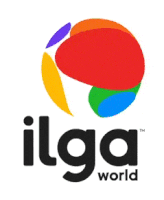
The International Lesbian, Gay, Bisexual, Trans and Intersex Association (ILGA) is a LGBTQ+ rights organization.

The homophile movement is a collective term for the main organisations and publications supporting and representing sexual minorities in the 1950s to 1960s around the world. The name comes from the term homophile, which was commonly used by these organisations. At least some of these organisations are considered to have been more cautious than both earlier and later LGBT organisations; in the U.S., the nationwide coalition of homophile groups disbanded after older members clashed with younger members who had become more radical after the Stonewall riots of 1969.

Allan Aubrey Boesak is a South African Dutch Reformed Church cleric, politician and anti-apartheid activist. He was sentenced to prison for fraud in 1999 but was subsequently granted an official pardon and reinstated as a cleric in late 2004.
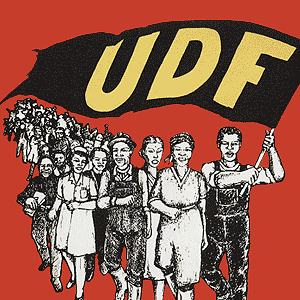
The United Democratic Front (UDF) was a South African popular front that existed from 1983 to 1991. The UDF comprised more than 400 public organizations including trade unions, students' unions, women's and parachurch organizations. The UDF's goal was to establish a "non-racial, united South Africa in which segregation is abolished and in which society is freed from institutional and systematic racism." Its slogan was "UDF Unites, Apartheid Divides." The Front was established in 1983 to oppose the introduction of the Tricameral Parliament by the white-dominated National Party government, and dissolved in 1991 during the early stages of the transition to democracy.

Lesbian, gay, bisexual, and transgender (LGBT) people in South Africa have the same legal rights as non-LGBT people. South Africa has a complex and diverse history regarding the human rights of LGBTQ people. The legal and social status of between 400,000 to over 2 million lesbian, gay, bisexual, transgender and intersex South Africans has been influenced by a combination of traditional South African morals, colonialism, and the lingering effects of apartheid and the human rights movement that contributed to its abolition.
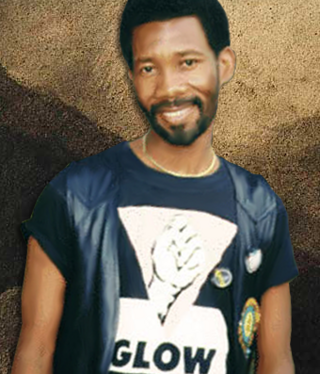
Simon Tseko Nkoli was an anti-apartheid, gay rights and AIDS activist in South Africa. Active in the Congress of South African Students (COSAS), the United Democratic Front, and the Gay Association of South Africa (GASA), he was arrested as part of the Delmas Treason Trial in 1984. After his release in 1988, he founded the Gay and Lesbian Organisation of the Witwatersrand (GLOW) and organized South Africa's first pride parade. His activism influenced the African National Congress (ANC) to enshrine gay rights in the South African constitution. One of the first South Africans to disclose that he was living with HIV/AIDS, Nkoli founded the Township AIDS Project. After his death from AIDS-related complications, his colleagues established the Treatment Action Campaign.

The Audre Lorde Project is a Brooklyn, New York–based organization for LGBTQ people of color. The organization concentrates on community organizing and radical nonviolent activism around progressive issues within New York City, especially relating to LGBTQ communities, AIDS and HIV activism, pro-immigrant activism, prison reform and organizing among youth of color. It is named for the lesbian-feminist poet and activist Audre Lorde and was founded in 1994.

Lesbian, gay, bisexual, and transgender (LGBT) people in Uganda face severe legal and social challenges not experienced by non-LGBTQ residents. Same-sex sexual activity is illegal for both men and women in Uganda. It was originally criminalised by British colonial laws introduced when Uganda became a British protectorate, and these laws have been retained since the country gained its independence.

LGBT movements in the United States comprise an interwoven history of lesbian, gay, bisexual, transgender and allied social movements in the United States of America, beginning in the early 20th century. A commonly stated goal among these movements is social equality for LGBT people. Some have also focused on building LGBT communities or worked towards liberation for the broader society from biphobia, homophobia, and transphobia. LGBT movements organized today are made up of a wide range of political activism and cultural activity, including lobbying, street marches, social groups, media, art, and research. Sociologist Mary Bernstein writes: "For the lesbian and gay movement, then, cultural goals include challenging dominant constructions of masculinity and femininity, homophobia, and the primacy of the gendered heterosexual nuclear family (heteronormativity). Political goals include changing laws and policies in order to gain new rights, benefits, and protections from harm." Bernstein emphasizes that activists seek both types of goals in both the civil and political spheres.
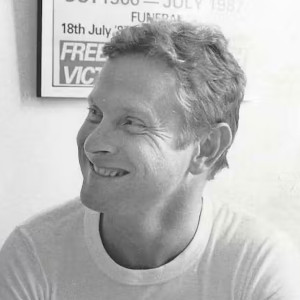
Ivan Peter Toms was a South African physician, who battled the Apartheid era government as a prominent anti-Apartheid and anti-conscription activist. He opposed conscription by the South African Defence Force, and was a co-founder of the End Conscription Campaign. He ran a clinic in the Crossroads shanty town where he was the only physician for 60,000 people. He went on a hunger strike in 1985 after the government decided to bulldoze the settlement. Toms was also involved with gay rights activism in South Africa and was a founding member of the Lesbians and Gays Against Oppression. At the time of his death in 2008, Toms was serving as the Director of Health for the city of Cape Town, South Africa.
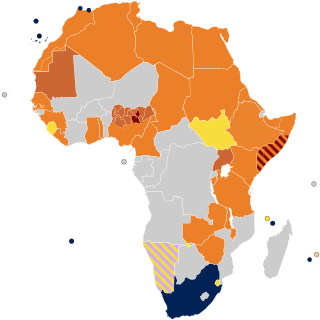
Lesbian, gay, bisexual, and transgender (LGBT) rights in Africa are generally poor in comparison to the Americas, Western Europe and Oceania.

Lesbian, gay, bisexual, and transgender (LGBT) people in Mongolia face legal and social challenges not experienced by non-LGBT people, though there have been substantial improvements since the 1990s. Homosexuality was criminalised in Mongolia in 1961 through its Criminal Code. Following the Mongolian Revolution of 1990 and the peaceful transition to a democracy, homosexuality was legalised and awareness about LGBT people has become more prevalent. Hate crimes on the basis of sexual orientation and gender identity result in additional legal penalties. Hate speech based on these two categories has been outlawed in the country since 1 July 2017. Households headed by same-sex couples are, however, not eligible for the same legal protections available to opposite-sex couples.
This is a timeline of notable events in the history of lesbian, gay, bisexual and transgender people in South Africa.
The Congress of Traditional Leaders of South Africa (CONTRALESA) is a South African non-governmental pressure group which was formed in 1987 by some of the traditional leaders of the homeland of KwaNdebele, with the support of the United Democratic Front and the African National Congress. Contralesa helped to form the anti-apartheid front in the homelands, and continues to advocate greater rights for traditional leaders in the country in the post-apartheid era.

The following outline offers an overview and guide to LGBTQ topics:
This is a timeline of notable events in the history of non-heterosexual conforming people of African ancestry, who may identify as LGBTIQGNC, men who have sex with men, or related culturally specific identities. This timeline includes events both in Africa, the Americas and Europe and in the global African diaspora, as the histories are very deeply linked.
The Gay and Lesbian Organization of Witwatersrand (GLOW) was a non-governmental organization in South Africa that focused on gay and lesbian community issues.
Lesbian erasure is a form of lesbophobia that involves the tendency to ignore, remove, falsify, or reexplain evidence of lesbian women or relationships in history, academia, the news media, and other primary sources. Lesbian erasure also refers to instances wherein lesbian issues, activism, and identity is deemphasized or ignored within feminist groups or the LGBT community.

Julia Nicol was a South African activist and librarian. Nicol worked with LGBT groups in South Africa and was a co-founder and leader of the Organisation of Lesbian and Gay Activists (OLGA).
References
- 1 2 Epprecht, Marc (2004). Hungochani: The History of a Dissident Sexuality in Southern Africa. London: McGill-Queen's University Press. p. 211. ISBN 978-0-7735-7211-9.
- 1 2 3 Christiansen, Eric C. (2000). "Ending the Apartheid of the Closet: Sexual Orientation in the South African Constitutional Process". International Law and Politics. 32: 1023–1024 – via GGU Law Digital Commons.
- ↑ Louw, Ronald (22 May 2014). "Advancing Human Rights Through Constitutional Protection for Gays and Lesbians in South Africa". In Graupner, Helmut; Tahmindjis, Phillip (eds.). Sexuality and Human Rights : A Global Overview . Binghamton, NY: Harrington Park Press. p. 148. ISBN 978-1-134-73257-9. OCLC 880877782 – via Internet Archive.
- 1 2 3 4 "Remembering and Honouring Julia Nicol" (PDF). GALA. Retrieved 6 June 2020.
- ↑ Nicol 2005, p. 72-73.
- ↑ Nicol 2005, p. 72.
- 1 2 3 4 5 6 Nicol, Julia (1991). "Organisation of Lesbian and Gay Activists". Agenda: Empowering Women for Gender Equity (11): 45–46. ISSN 1013-0950. JSTOR 4547977.
- ↑ Brown, Gavin (2012-05-17). "Standing by Ivan Toms: lesbians and gay men against apartheid #IDAHO". Non-Stop Against Apartheid. Retrieved 2020-06-06.
- ↑ Nicol 2005, p. 73-74.
- ↑ Thoreson, Ryan Richard (2008). "Somewhere over the Rainbow Nation: Gay, Lesbian and Bisexual Activism in South Africa". Journal of Southern African Studies. 34 (3): 689–690. doi:10.1080/03057070802259969. ISSN 0305-7070. JSTOR 40283175. S2CID 144424127.